A 1000 calorie diet plan is a very low-calorie diet (VLCD) designed for short-term use, not long-term weight management.
It can help some people achieve rapid weight loss, but it comes with serious risks if followed without medical supervision. Understanding the structure, benefits, and dangers of such a plan is essential before starting.
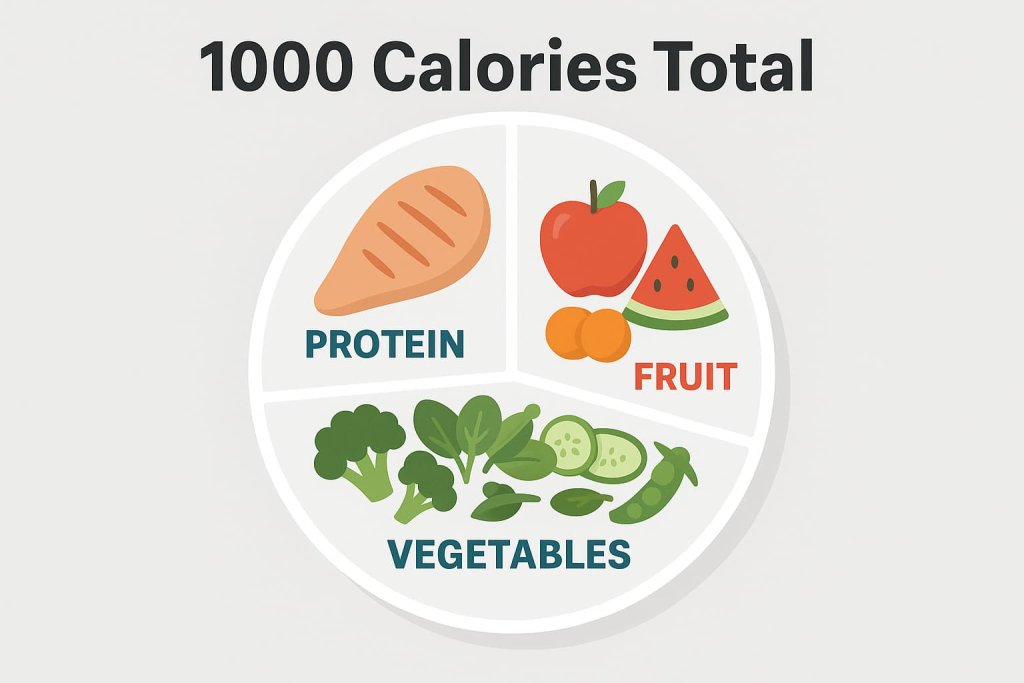
This guide explains how a 1000 calorie diet works, who it may be suitable for, safe sample menus, and when to avoid it. You’ll also find safety tips, expert guidance, and answers to common questions.
What Is a 1000 Calorie Diet Plan?
A 1000 calorie diet restricts daily intake to about 1,000 calories — far below the average adult requirement of 1,800–2,400 calories.
It falls into the very low-calorie diet (VLCD) category and is usually intended for short-term use under medical supervision, such as before bariatric surgery or in specialized weight-loss clinics.
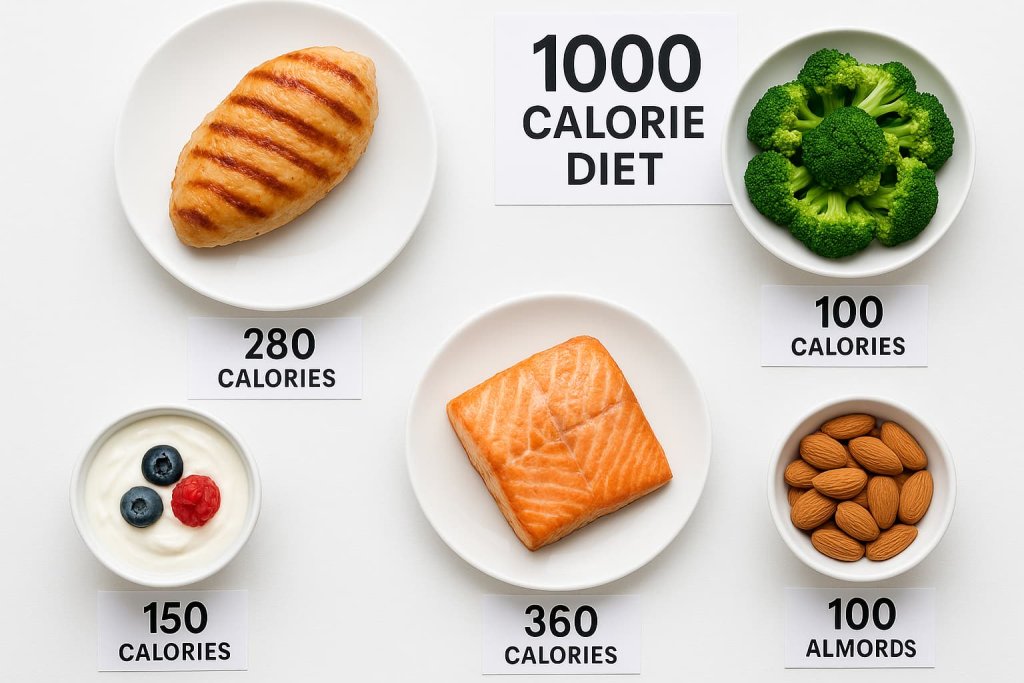
How Long Can You Stay on a 1000 Calorie Diet?
A 1000 calorie diet should only be followed for a short period of time — typically a few days up to two weeks, and only under medical supervision.
Experts classify it as a very low-calorie diet (VLCD). VLCDs are usually prescribed in clinical settings for rapid weight loss before surgery or as part of a structured weight-loss program.
Key Points:
- Not for long-term use: Following this diet for months can lead to nutrient deficiencies, gallstones, hormonal imbalances, and metabolic slowdown.
- Short-term effectiveness: Studies show that VLCDs can produce rapid results in the first 1–2 weeks, but weight loss is not sustainable without a proper transition plan.
- Medical guidance required: Doctors often provide supplements (protein shakes, multivitamins) to cover nutrition gaps during a 1000 calorie diet.
- Safe transition: After the short phase, most programs gradually increase calories to 1,200–1,500 per day while focusing on balanced nutrition.
👉 Bottom line: A 1000 calorie diet is not designed for everyday use. If you attempt it, keep it short-term and supervised, and follow with a structured refeeding or maintenance plan.
Benefits of a 1000 Calorie Diet
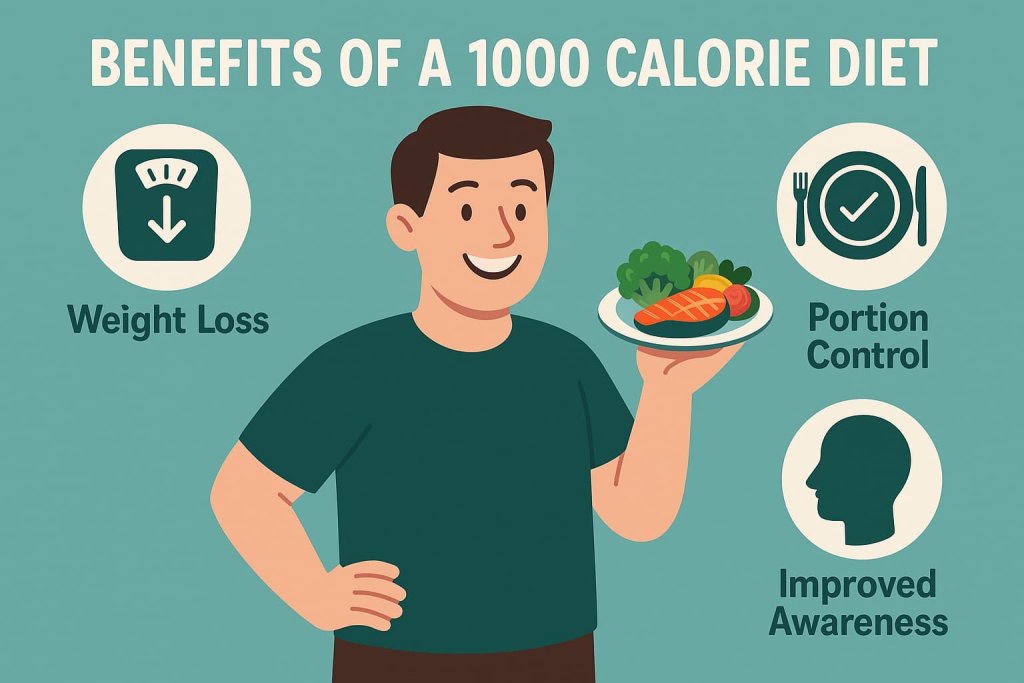
- Rapid Weight Loss: Cutting calories drastically can lead to quick, noticeable weight reduction, especially in the first 1–2 weeks.
- Short-Term Medical Use: Doctors may prescribe VLCDs before surgery to shrink the liver and reduce surgical risks.
- Portion Control Training: Some find it useful for resetting portion awareness when reintroducing higher-calorie diets later.
⚠️ However, these benefits are short-lived without long-term lifestyle changes.
Risks and Drawbacks
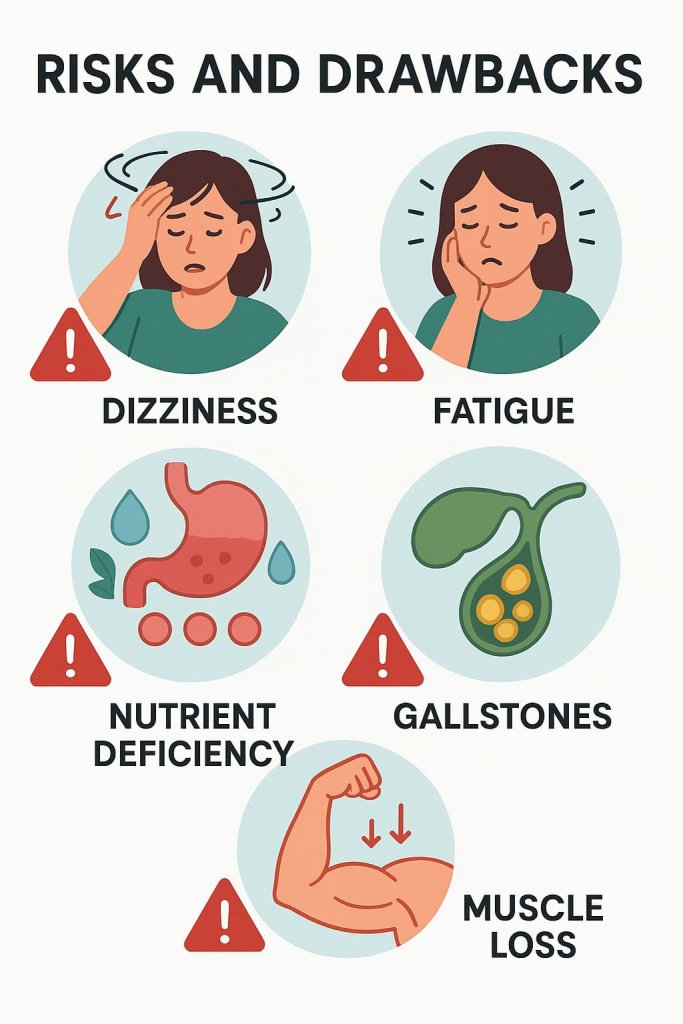
- Nutrient Deficiencies: Hard to meet daily vitamin and mineral needs on so few calories.
- Muscle Loss: Without sufficient protein, lean mass may decline along with fat.
- Fatigue & Dizziness: Low energy can cause weakness, fainting, or headaches.
- Gallstones: Rapid weight loss increases gallstone risk.
- Metabolic Slowdown: Prolonged calorie restriction can reduce resting metabolism.
➡️ Because of these risks, health professionals recommend limiting this plan to short periods only.
Who Should Consider (and Who Should Avoid)
May be considered (with doctor supervision):
- Adults with obesity (BMI ≥30) preparing for surgery
- Patients enrolled in structured medical weight-loss programs
Should avoid:
- Pregnant or breastfeeding women
- Children, teens, and elderly adults
- Anyone with eating disorders, heart disease, or chronic illness without medical guidance
Sample 1000 Calorie Diet Plan (1 Day Menu)
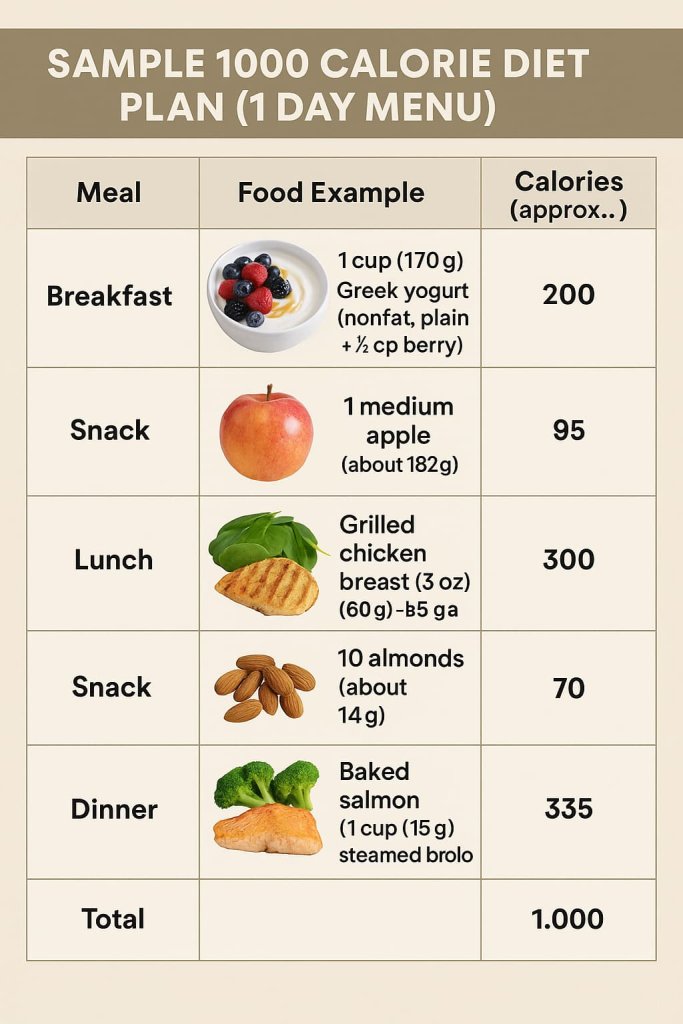
| Meal | Food Example with Measurements | Calories (approx.) |
|---|---|---|
| Breakfast | ¾ cup (170 g) nonfat plain Greek yogurt + ½ cup (75 g) mixed berries + 1 tsp (7 g) honey | 200 |
| Snack | 1 medium apple (about 150 g) | 95 |
| Lunch | 3 oz (85 g) grilled chicken breast + 2 cups (60 g) fresh spinach + 1 Tbsp (15 ml) vinaigrette | 300 |
| Snack | 10 whole almonds (about 14 g / 0.5 oz) | 70 |
| Dinner | 3 oz (85 g) baked salmon + 1 cup (150 g) steamed broccoli + 1 lemon wedge (15 g) | 335 |
| Total | 1,000 |
Foods to Include and Avoid on a 1000 Calorie Diet
Because a 1000 calorie diet is extremely restrictive, every bite needs to count. The goal is to pack in protein, fiber, and micronutrients while keeping calories low.
✅ Foods to Include
Focus on nutrient-dense, low-calorie options that keep you fuller for longer.
- Lean Proteins:
- Skinless chicken breast (3 oz / 85 g = ~140 kcal)
- Salmon or white fish (3 oz / 85 g = 120–170 kcal)
- Egg whites (3 whites = ~50 kcal)
- Nonfat Greek yogurt (¾ cup / 170 g = ~100 kcal)
- Vegetables (non-starchy):
- Fruits (low-sugar, high-fiber):
- Berries (½ cup / 75 g = ~40 kcal)
- Apple (1 medium / 150 g = ~95 kcal)
- Orange (1 medium / 130 g = ~60 kcal)
- Healthy Fats (in small amounts):
- Almonds (10 pieces / 14 g = ~70 kcal)
- Avocado (¼ fruit / 50 g = ~80 kcal)
- Olive oil (1 tsp / 5 g = ~40 kcal)
❌ Foods to Avoid
These foods are calorie-dense but low in nutrients — they will quickly blow your 1000 calorie budget.
- Refined Carbs & Sugary Foods:
- White bread, pastries, cookies, cakes
- Sugary cereals and candy
- Fried & Fast Foods:
- French fries, fried chicken, burgers, pizza
- Chips and packaged snack foods
- High-Calorie Beverages:
- Soda, sweetened juices, sports drinks
- Alcohol (beer, wine, cocktails)
- Large Portions of Starchy Foods:
- Pasta, rice, potatoes, white flour products
👉 Pro tip: On a 1000 calorie diet, try to aim for at least 60–80 g of protein per day to help preserve muscle mass while cutting calories.
Safety Tips for Following a 1000 Calorie Diet
- Always consult a doctor or dietitian before starting.
- Take a multivitamin to cover nutrient gaps.
- Drink plenty of water and stay hydrated.
- Avoid strenuous exercise during the diet.
- Use only for a short-term reset or under supervision.
Alternatives to Consider
A 1000 calorie diet may give rapid short-term results, but it’s too restrictive for long-term health. Safer, more sustainable alternatives include:
High-Protein, Moderate Calorie Deficit
- Aim for a daily calorie deficit of about 500 calories.
- Focus on 60–100 g of protein per day from lean meats, eggs, beans, or Greek yogurt.
- This method promotes fat loss while preserving muscle mass.
1,500–1,800 Calorie Balanced Diet
- A moderate intake supports steady, sustainable weight loss of about 1–2 pounds per week.
- Allows more variety, making it easier to meet nutrient needs and stick to long term.
- Ideal for most adults trying to lose weight without extreme hunger or fatigue.
Mediterranean Diet
- Emphasizes whole grains, vegetables, fruits, olive oil, fish, and nuts.
- Backed by research for improving heart health, blood sugar control, and weight management.
- Flexible, enjoyable, and proven to work as a long-term lifestyle plan.
👉 Bottom line: If your goal is lasting results, choose a balanced calorie deficit or Mediterranean approach over an extreme 1000 calorie restriction.
1000 Calorie Diet vs. 1500 Calorie Diet vs. Mediterranean Diet
| Feature | 1000 Calorie Diet | 1500 Calorie Diet | Mediterranean Diet |
|---|---|---|---|
| Calories/Day | ~1,000 kcal | ~1,500–1,800 kcal | Varies (typically 1,500–2,200 kcal depending on needs) |
| Main Goal | Rapid short-term weight loss | Steady, sustainable weight loss | Long-term health & weight management |
| Protein Intake | 60–80 g/day (must be monitored closely) | 70–100 g/day (easier to maintain) | Moderate (fish, legumes, lean meats, dairy) |
| Food Variety | Very limited, high restriction | Moderate — more room for variety | Very diverse, includes whole grains, vegetables, fruits, olive oil, fish |
| Nutrient Adequacy | Risk of deficiencies, needs supplements | Easier to meet nutrient requirements | Naturally nutrient-rich, heart-healthy |
| Safety | Only safe short-term, under supervision | Safe for most adults | Safe and recommended as a lifestyle |
| Best For | Pre-surgery prep or medical programs | Adults seeking gradual fat loss | Anyone seeking sustainable weight & heart health |
| Risks | Muscle loss, gallstones, fatigue, rebound weight gain | Hunger if poorly planned, slower results | Few risks; balance prevents deficiencies |
FAQs About the 1000 Calorie Diet Plan
1. Is a 1000 calorie diet safe for weight loss?
It may be safe for short-term use under medical supervision, but most health experts warn against long-term use because it is too low in calories and nutrients.
2. How much weight can I lose on 1000 calories a day?
Many people lose 2–3 pounds per week initially, but this rapid weight loss often slows down and can come with risks like muscle loss or gallstones.
3. Can I exercise while eating 1000 calories a day?
Light activity such as walking, yoga, or stretching is fine, but intense workouts are not recommended due to low energy intake.
4. What foods should I eat on this diet?
Choose lean proteins, vegetables, low-sugar fruits, and small portions of healthy fats. Protein should stay around 60–80 g/day to preserve muscle.
5. Who should avoid this diet?
Children, teens, pregnant or breastfeeding women, older adults, and anyone with eating disorders or chronic medical conditions should not attempt it without a doctor’s guidance.
6. Can I follow a 1000 calorie plan without medical help?
No. Because of the high risk of nutrient deficiencies and health complications, professional guidance is strongly recommended.
7. What happens if I stay on it too long?
Prolonged use can cause metabolic slowdown, nutrient deficiencies, hormonal issues, and rebound weight gain once regular eating resumes.
Conclusion: Should You Try a 1000 Calorie Diet?
A 1000 calorie diet plan can deliver rapid short-term weight loss, but it is not designed for long-term health or sustainability. Without professional oversight, it carries real risks like nutrient deficiencies, fatigue, and rebound weight gain.
If you are considering it, do so only under medical supervision and for a short period. For most people, a more sustainable approach is a moderate calorie deficit (500–700 calories/day) combined with balanced nutrition and regular physical activity.
👉 Bottom line: A 1000 calorie diet may work as a temporary reset, but for lasting results, focus on gradual, sustainable lifestyle changes instead of extreme restrictions.
References
- Medical News Today – 1000 calorie diet: Risks, benefits, and safe weight loss
- Mayo Clinic – Counting calories: Get back to weight-loss basics
- Centers for Disease Control and Prevention (CDC) – Healthy Weight, Nutrition, and Physical Activity
- NIH (NIDDK) – Very Low-Calorie Diets
- PubMed Central – Effects of Prescribing 1000 versus 1500 Kilocalories per Day in a Behavioral Weight Loss Program
- Harvard T.H. Chan School of Public Health – The Mediterranean Diet
- American Heart Association – Mediterranean Diet
